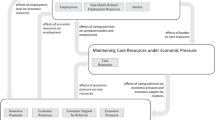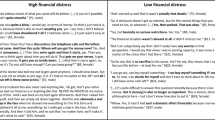Abstract
Purpose
The rising cost of breast cancer treatment has increased patients’ financial burden, intensifying an already stressful treatment process. Although researchers increasingly recognize the harmful impact of medical and nonmedical costs associated with cancer treatment, understanding patients’ perspectives of financial toxicity is limited. We aimed to explore the topic of financial toxicity through the lived experiences of patients with breast cancer from groups at risk of social and economic marginalization.
Methods
We conducted semi-structured interviews with 50 women with breast cancer from four specific groups: Black women, Medicaid enrollees, rural residents, and women age ≤ 40. We transcribed, coded, and analyzed the data using deductive and inductive approaches.
Results
Two overarching themes captured patients’ experiences of financial toxicity: short-term and long-term impacts. Short-term stressors included direct medical (e.g., co-pays, premiums), nonmedical (e.g., transportation, lodging), and indirect (e.g., job loss, reduced work hours) costs. Early in their treatments, patients’ focus on survival took precedence over financial concerns. However, as the treatment course progressed, fear of consequences from compounding costs of care and financial distress negatively impacted patients’ lifestyles and outlooks for the future.
Conclusion
Programs addressing financial toxicity that look beyond early-phase interventions are needed. Specifically, patients struggling with the accumulation of treatment costs and the resultant stress require ongoing support. Long-term support is especially needed for groups vulnerable to financial instability and social marginalization.
Similar content being viewed by others
References
Witte J, Mehlis K, Surmann B, Lingnau R, Damm O, Greiner W, Winkler EC (2019) Methods for measuring financial toxicity after cancer diagnosis and treatment: a systematic review and its implications. Ann Oncol 30(7):1061–1070
Zafar SY, Peppercorn JM, Schrag D, Taylor DH, Goetzinger AM, Zhong X, Abernethy AP (2013) The financial toxicity of cancer treatment: a pilot study assessing out-of-pocket expenses and the insured cancer patient’s experience. Oncologist 18(4):381–390
Altice CK, Banegas MP, Tucker-Seeley RD, Yabroff KR (2017) Financial hardships experienced by cancer survivors: a systematic review. JNCI. J Natl Cancer Inst 109(2):djw205
Lentz R, Benson AB III, Kircher S (2019) Financial toxicity in cancer care: prevalence, causes, consequences, and reduction strategies. J Surg Oncol 120(1):85–92
Gordon LG, Merollini KMD, Lowe A, Chan RJ (2017) A systematic review of financial toxicity among cancer survivors: we can’t pay the co-pay. Patient. 10(3):295–309
Chan RJ, Gordon LG, Tan CJ, Chan A, Bradford NK, Yates P, Agbejule OA, Miaskowski C (2019) Relationships between financial toxicity and symptom burden in cancer survivors: a systematic review. J Pain Symptom Manage 57(3):646–660.e1
Park J, Look KA (2018) Relationship between objective financial burden and the health-related quality of life and mental health of patients with cancer. J Oncol Pract 14(2):e113–e121
Blum-Barnett E, Madrid S, Burnett-Hartman A, Mueller SR, McMullen CK, Dwyer A, Feigelson HS (2019) Financial burden and quality of life among early-onset colorectal cancer survivors: a qualitative analysis. Health Expect 22(5):1050–1057
Smith GL, Lopez-Olivo MA, Advani PG, Ning MS, Geng Y, Giordano SH, Volk RJ (2019) Financial burdens of cancer treatment: a systematic review of risk factors and outcomes. J Natl Compr Canc Netw 17(10):1184–1192
Ramsey SD, Bansal A, Fedorenko CR, Blough DK, Overstreet KA, Shankaran V, Newcomb P (2016) Financial insolvency as a risk factor for early mortality among patients with cancer. J Clin Oncol 34(9):980–986
Timmons A, Gooberman-Hill R, Sharp L (2013) “It’s at a time in your life when you are most vulnerable”: a qualitative exploration of the financial impact of a cancer diagnosis and implications for financial protection in health. PloS One 8(11):e77549
Sharp L, Timmons A (2016) Pre-diagnosis employment status and financial circumstances predict cancer-related financial stress and strain among breast and prostate cancer survivors. Support Care Cancer 24(2):699–709
Chen JE, Lou VW, Jian H, Zhou Z, Yan M, Zhu J, Li G, He Y (2018) Objective and subjective financial burden and its associations with health-related quality of life among lung cancer patients. Support Care Cancer 26(4):1265–1272
Chebli P, Lemus J, Avila C, Peña K, Mariscal B, Merlos S, Guitelman J, Molina Y (2020) Multilevel determinants of financial toxicity in breast cancer care: perspectives of healthcare professionals and Latina survivors. Support Care Cancer 28(7):3179–3188
Irwin B, Kimmick G, Altomare I, Marcom PK, Houck K, Zafar SY, Peppercorn J (2014) Patient experience and attitudes toward addressing the cost of breast cancer care. Oncologist 19(11):1135–1140
Ehsan AN, Wu CA, Minasian A, Singh T, Bass M, Pace L, Ibbotson GC, Bempong-Ahun N, Pusic A, Scott JW, Mekary RA, Ranganathan K (2023) Financial toxicity among patients with breast cancer worldwide: a systematic review and meta-analysis. JAMA Netw Open 6(2):e2255388–e2255388
Yusuf M, Pan J, Rai SN, Eldredge-Hindy H (2022) Financial toxicity in women with breast cancer receiving radiation therapy: final results of a prospective observational study. Pract Radiat Oncol 12(2):e79–e89
Offodile AC, Asaad M, Boukovalas S, Bailey C, Lin YL, Teshome M, Greenup RA, Butler C (2021) Financial toxicity following surgical treatment for breast cancer: a cross-sectional pilot study. Ann Surg Oncol 28(5):2451–2462
Jagsi R, Ward KC, Abrahamse PH, Wallner LP, Kurian AW, Hamilton AS, Katz SJ, Hawley ST (2018) Unmet need for clinician engagement regarding financial toxicity after diagnosis of breast cancer. Cancer. 124(18):3668–3676
Rosenzweig M, West M, Matthews J, Stokan M, Kook Y, Gallups S, Diergaarde B (2019) Financial toxicity among women with metastatic breast cancer. Oncol Nurs Forum 46(1):83–91
Politi MC, Yen RW, Elwyn G, O’Malley AJ, Saunders CH, Schubbe D, Forcino R, Durand MA (2021) Women who are young, non-white, and with lower socioeconomic status report higher financial toxicity up to 1 year after breast cancer surgery: a mixed-effects regression analysis. Oncologist. 26(1):e142–e152
Meernik C, Sandler DP, Peipins LA, Hodgson ME, Blinder VS, Wheeler SB, Nichols HB (2021) Breast cancer-related employment disruption and financial hardship in the sister study. JNCI Cancer Spectr 5(3)
Obeng-Gyasi S, Timsina LR, Bhattacharyya O, Fisher CS, Haggstrom DA (2021) Bankruptcy among insured surgical patients with breast cancer: who is at risk? Cancer. 127(12):2083–2090
Panzone J, Welch C, Morgans A, Bhanvadia SK, Mossanen M, Shenhav-Goldberg R, Chandrasekar T, Pinkhasov R, Shapiro O, Jacob JM, Basnet A, Bratslavsky G, Goldberg H (2022) Association of race with cancer-related financial toxicity. JCO Oncol Pract 18(2):e271–e283
Zheng Z, Jemal A, Tucker-Seeley R, Banegas MP, Han X, Rai A, Zhao J, Yabroff KR (2020) Worry about daily financial needs and food insecurity among cancer survivors in the United States. J Natl Compr Canc Netw 18(3):315–327
Wu VS, Benedict C, Friedman DN, Watson SE, Anglade E, Zeitler MS, Chino F, Thom B (2023) Do discussions of financial burdens decrease long-term financial toxicity in adolescent and young adult cancer survivors? Support Care Cancer 31(7):434
Williams DR, Lawrence JA, Davis BA, Vu C (2019) Understanding how discrimination can affect health. Health Serv Res 54(S2):1374–1388
Solar O, Irwin A (2010) A conceptual framework for action on the social determinants of health. World Health Organization https://apps.who.int/iris/handle/10665/44489
Morris WL, Sinclair S, DePaulo BM (2007) No shelter for singles: the perceived legitimacy of marital status discrimination. Group Process Intergroup Relat 10(4):457–470
Budgeon S (2015) The “problem” with single women: choice, accountability and social change. J Soc Pers. Relat 33(3):401–418
Collins C, Williams DR (1999) Segregation and mortality: the deadly effects of racism. Sociological Forum 14(3):495–523
Sironi M (2018) Economic conditions of young adults before and after the great recession. J Fam Econ Issues 39(1):103–116
Tong A, Sainsbury P, Craig J (2007) Consolidated criteria for reporting qualitative research (COREQ): a 32-item checklist for interviews and focus groups. International J Qual Health Care 19(6):349–357
USDA ERS - Rural-Urban Continuum Codes 2013 . https://www.ers.usda.gov/data-products/rural-urban-continuum-codes.aspx
QSR International Pty Ltd. NVivo12. 2018. https://www.qsrinternational.com/nvivo-qualitative-data-analysis-software/home
Vaismoradi M, Turunen H, Bondas T (2013) Content analysis and thematic analysis: implications for conducting a qualitative descriptive study. Nurs Health Sci 15(3):398–405
Braun V, Clarke V (2006) Using thematic analysis in psychology. Qual Res Psychol 3(2):77–101
Carrera PM, Kantarjian HM, Blinder VS (2018) The financial burden and distress of patients with cancer: understanding and stepping-up action on the financial toxicity of cancer treatment. CA Cancer J Clin 68(2):153–165
Head B, Harris L, Kayser K, Martin A, Smith L (2018) As if the disease was not enough: coping with the financial consequences of cancer. Support Care Cancer 26(3):975–987
Joyce DD, Schulte PJ, Kwon ED, Dusetzina SB, Penson DF, Tilburt JC, Boorjian SA (2023) Financial toxicity and coping mechanisms in patients with metastatic prostate cancer: a pilot study. JCO. 41(6):125–125
Hallgren E, Moore R, Ayers BL, Purvis RS, Bryant-Smith G, DelNero P, McElfish PA (2023) It was kind of a nightmare, it really was: financial toxicity among rural women cancer survivors. J Cancer Surviv. https://doi.org/10.1007/s11764-023-01344-x
Spencer JC, Rotter JS, Eberth JM, Zahnd WE, Vanderpool RC, Ko LK, Davis MM, Troester MA, Olshan AF, Wheeler SB (2020) Employment changes following breast cancer diagnosis: the effects of race and place. J Natl Cancer Inst 112(6):647–650
Wheeler SB, Spencer JC, Pinheiro LC, Carey LA, Olshan AF, Reeder-Hayes KE (2018) Financial impact of breast cancer in black versus white women. J Clin Oncol 36(17):1695–1701
Pisu M, Banegas MP, Liang MI, Tuzzio L, Henrikson NB (2020) How, when, and with whom should cost of care conversations occur? Preferences of two distinct cancer survivor groups. JCO Oncology Practice 16(9):e912–e921
Funding
This research leading to these results was funded by Paul Calabresi Career Development Award (K12 CA133250).
Author information
Authors and Affiliations
Contributions
Conceptualization: Samilia Obeng-Gyasi
Methodology: Karen Shiu-Yee, Laura J. Rush, Ann Scheck McAlearney, Samila Obeng-Gyasi
Formal analysis and investigation: Sandy Lee, Ramona G. Olvera, Karen Shiu-Yee, Laura J. Rush, Willi L. Tarver, Tessa Blevins, Ann Scheck McAlearney, Samilia Obeng-Gyasi
Writing — original draft preparation: Sandy Lee, Ramona G. Olvera
Writing — review and editing: all authors
Funding acquisition: Samilia Obeng-Gyasi
Resources and supervision: Ann Scheck McAlearney, Barbara L. Andersen, Electra D. Paskett, William E. Carson, Samilia Obeng-Gyasi
Corresponding author
Ethics declarations
Ethics approval
This study was performed in line with the principles of the Declaration of Helsinki. Approval was granted by the Institutional Review Board of The Ohio State University (Date 11/17/2020/No. 2020C0174).
Consent to participate
Verbal informed consent was obtained prior to interviews.
Conflict of interest
SOG is funded by the Paul Calabresi Career Development Award (K12 CA133250), Conquer Cancer Breast Cancer Research Foundation Advanced Clinical Research Award for Diversity and Inclusion in Breast Cancer Research, The Society of University Surgeons, and the American Cancer Society (RSG-22-106-01-CSCT). EDP is the MPI on grants to the institution from Merck Foundation, Pfizer, Genentech, and Guardant Health. She is also an advisor to Glaxo-Smith Klein. JCC receives funding from The Ohio State University Comprehensive Cancer Center Pelotonia Grant. SL, RGO, KSY, LJR, WLT, TB, ASM, BLA, and WEC have no relevant financial or non-financial interests to disclose.
Additional information
Publisher’s note
Springer Nature remains neutral with regard to jurisdictional claims in published maps and institutional affiliations.
Sandy Lee and Ramona G. Olvera are shared first authors.
Supplementary information
ESM 1
(DOCX 38 kb)
Rights and permissions
Springer Nature or its licensor (e.g. a society or other partner) holds exclusive rights to this article under a publishing agreement with the author(s) or other rightsholder(s); author self-archiving of the accepted manuscript version of this article is solely governed by the terms of such publishing agreement and applicable law.
About this article
Cite this article
Lee, S., Olvera, R.G., Shiu-Yee, K. et al. Short-term and long-term financial toxicity from breast cancer treatment: a qualitative study. Support Care Cancer 32, 24 (2024). https://doi.org/10.1007/s00520-023-08199-z
Received:
Accepted:
Published:
DOI: https://doi.org/10.1007/s00520-023-08199-z




